#The Sound of my 1991
Explore tagged Tumblr posts
Text
#nowplaying#1991#The Sound of my 1991#The Sound of my spotify#The Sound of my#Stephan Eicher#Queen#Michael Jackson#Nina Hagen#Sting#Dire Straits#Marc Almond#Alison Moyet#George Michael#Elton John#a-ha#Spotify
4 notes
·
View notes
Text

This is out of fun and personal ideas and i watched more versions but I was tired to find them all
#my memes#beaty and the beast#this is personal opinion#also for shits and giggles#beauty and the beast 1991#Beaty and the beast 2017#belle et la bete 1946#Belle et la bete 2014#beauty and the beast 1987#faerie tales theater#beauty and the beast 1976#the scarlet flower#panna a netvor#beastly#Die Schöne und das Biest 2012#Manga Sekai Mukashi Banashi#Megan Kearney beauty and the beast#happily ever after tales for every child#the last one on far right is my personal take#idk still how to call the story#the first title I tried sounded too edgy so for now I’ll keep the classic
105 notes
·
View notes
Text





Alice in Chains ☀️
#alice in chains#layne staley#jerry cantrell#mike starr#sean kinney#grunge#90s#rock#aic#legend#90s vintage#rock photography#90s grunge#seattle sound#grunge bands#heavy metal#hard rock#1991#metal#60s 70s 80s 90s#legends#fav#heavy rock#my loves
65 notes
·
View notes
Text
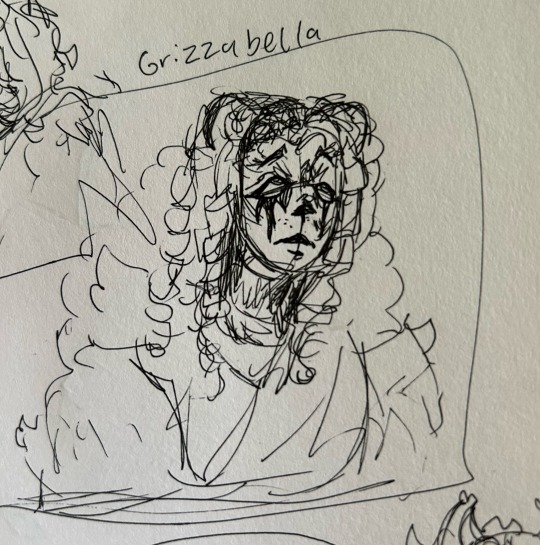
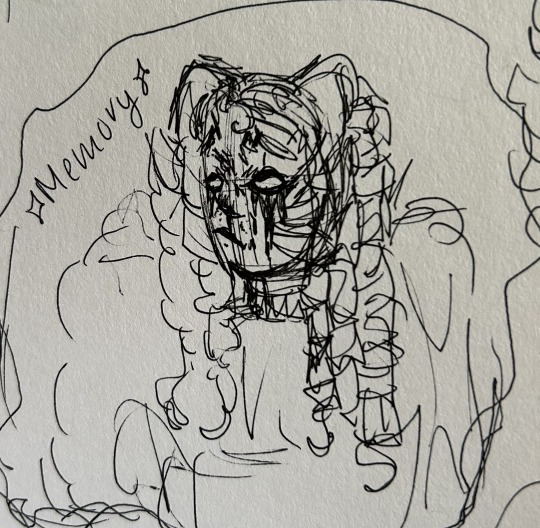
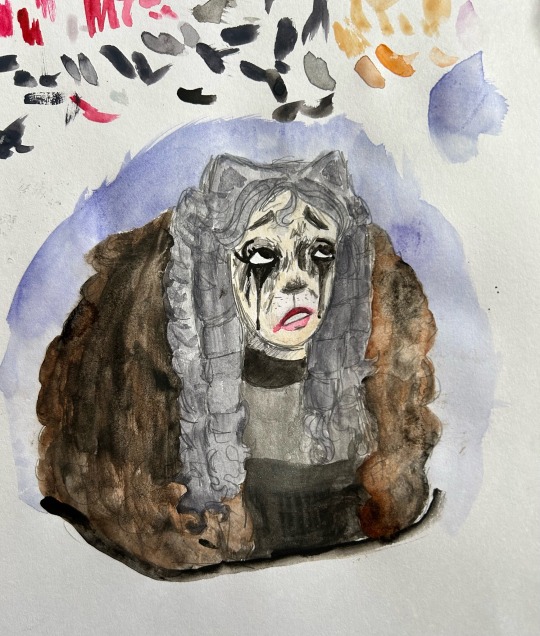
Hey guys, Memory is, like, a really good song
#its Grizabella!#Der Katzenstar!!!#why oh why didn’t I do this one watercolor paper 😭😭#I have many regrets#in my defense this is for an art assignment due tomorrow (it was due last Thursday)#for reference: this Grizzabella design is very very based on Mexico’s 1991 production#bc she looks literally stunning there and I am nothing if not a lover of women#I’m actually super proud of the top left sketch#grizabella I adore you#speaking of the 1991 Mexican production#Grizabella has some fucking INSANE belting technique for Memory that kinda jumpscared me a bit lol#I have literally never heard someone else sing the climax like that before#it sounds great I think she sounds amazing#I wish I sounded like that#anyhow uh grizabella ily <3333 you’re doing amazing sweetie and Memory makes me cry like a baby <3333#grizabella#grizabella the glamour cat#cats the musical#cats musical
67 notes
·
View notes
Text

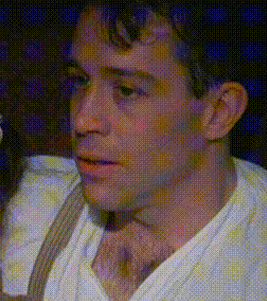
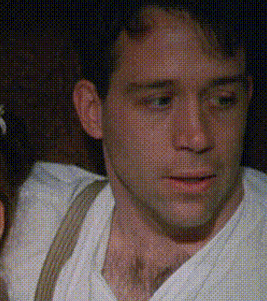

The incredibly talented and gorgeous Tom Hulce as Ivan Sanchin, from The Inner Circle (dir. Andrei Konchalovsky, 1991)
#cant describe how much i love this film#Probs my top 3 of Mr Hulce movies after Amadeus and D&E#also this was the first movie watched during my Tom Hulce Filmography Marathon 2024 so it has a special place in my heart#phenomenal masterclass acting#absolutely brilliant performance#But my poor king did not enjoy filming this at all it seems#he said it had been really difficult well it was in Russia in early 90s#almost sounded like this experience helped him move towards his early retirement#i dont know this makes me feel so strange cause#this is an incredible piece of art and Tom is totally in his element here#it is pure theatre work like Forget-me-not Lane#But if this had smthg to do with him quitting acting...?oh I hope not it kills me inside#gorgeous queer king#tom hulce#the inner circle#the inner circle 1991#filmgifs#moviegifs#thgop#My queer king#I WILL PROTECT YOU MY LIEGE I WILL FIGHT FOR YOU#Ivan sanchin#Ivan sanshin#andrei konchalovsky#I have so many Ivan gif making lined up it ain't even funny
17 notes
·
View notes
Text







ANDREW ROBINSON as sheriff Aaron Starett
Into the Badlands (TV, 1991), directed by Sam Pillsburry
Director of photography - Johnny E. Jensen















#andy robinson#andrew robinson#andy my beloved#aaron starett#into the badlands#1991#1990s#90s#western#i really love this final andy scene in the movie#nick cave's stagger lee must sounds here for my taste
8 notes
·
View notes
Note
Hey Finn! I hope you're doing/getting better
I just wanted to swing by and remind you that I adore your content and every time you post I get so excited that I start stimming. Your artwork is lovely, you take your time putting it out there, it's 100% worth the wait
Also it 100% inspires me to work on my own stuff when I see you post. You keep doing you, you're doing an amazing job!
thank you dearly, porter! it makes me so unbelievably happy to see i inspire you as you inspire me!
#sorry if i sound weird i'm watching beauty and the beast (1991) rn and its fancy language invades my mind#asks#sillysquealingswine
7 notes
·
View notes
Text
Also! Don't underestimate the value of doing something WITH the person. Whether that means, them watching you, or you watching them, or whatever. Literally, that entire watermelon convo could have been five seconds long if they had a watermelon on hand
I know it's a metaphor. But sometimes it isn't
Show, Don't Tell
Imagine if you met someone who can't eat watermelon. Not that they're allergic or unable somehow, but they just haven't figured out how to do that. So you're like "what the hell do you mean? it works just like eating anything else, you open your mouth, sink your teeth in, take a bite and chew. If you can bite, chew and swallow, you should be able to eat a watermelon."
And they agree that yes, they do know how to eat, in theory. The problem is the watermelon. Surely, if they figured out where to start, they'd figure out how to do it, but they have no clue how to get started with it.
This goes back and forth. No, it's not an emotional issue, they're not afraid of the watermelon. They can eat any other fruit, other sweet things, and other watery things ("it's watery?" they ask you). Is it the colour? Do they have a problem eating things that are green on the outside and red on the inside?
"It's red on the inside?"
Wait, they've never seen the inside? At this point you have to ask them how, exactly, they eat the watermelon. So to demonstrate, they take a whole, round, uncut watermelon, and try to bite straight into it. Even if they could bite through the crust, there's no way to get human jaws around it.
"Oh, you're supposed to cut it first. You cut the crust open and only chew through the insides."
And they had no idea. All their life this person has had no idea how to eat a watermelon, despite of being told again and again and again that it's easy, it's ridiculous to struggle with something so simple, there's no way that someone just can't eat a watermelon, how can you even mange to be bad at something as fucking simple as eating watermelon.
If someone can't do something after being repeatedly told to "just do it", there might be some key component missing that one side has no idea about, and the other side assumed was so obvious it goes without mention.
#show dont tell#i speak#watermelon#how to#clarinet#the clarinet story#lives in my head#rent free#now#training#this story sounds like how i remember the#pineapple scene#from#only yesterday 1991
113K notes
·
View notes
Text
listening to ethel cain's perverts album and reading about abortion in the US in the 19th century... this is exactly where i'm supposed to be
#the swarm#absolutely banger album for this reading btw#also time is a flat fucking circle#i'm reading this paper like “DAMN when was this published?? ...... 1991.....🚬”#these stories are sounding a bit too familiar for my liking😁!
1 note
·
View note
Text
#nowplaying#1991#The Sound of my 1991#The Sound of my youtube#The Sound of my#Queen#Basily#Sting#Marc Almond#Dire Straits#George Michael#Elton John#Fields Of The Nephilim#Udo Lindenberg#Falco
0 notes
Text
it really just continues to absolutely fucking disgust me how usa server minimum wage is still only $2.13 an hour....and it hasn't risen since 1991................
#i know some states and jurisdictions have better wages but that's the federal minimum cash wage#like.............#please please please keep that in mind if you're at a restaurant#/especially/ if it's a chain#cracker barrel worked so fucking hard to make it sound like a good thing bc#''we don't make you tip pool so you get to keep 100% of your tips!''#as if that somehow made up for the whole paying us 2.13 an hour thing#idk i've just been on that side idc how shitty the service is i just can't take it out on my server's tip#1991.................#33 fucking years#no wonder this country is fucking collapsing
1 note
·
View note
Text
Everyone gets “The 90s” look wrong and I hate it
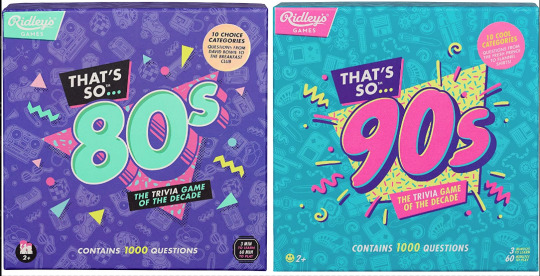
Couple years ago I saw these two board games at the store back to back. Well, not saw them per se, but ya know. Spied them out of the corner of my eye. And for a moment without reading the text, I couldn’t tell you which was which decade at first. Funny. Either they were in a rush to get these out the door or they wanted their throwback trivia game boxes to look uniform. I didn’t think too much of it.
Only, from then on I started seeing it MORE. Every time someone markets a 90s or 80s throwback...


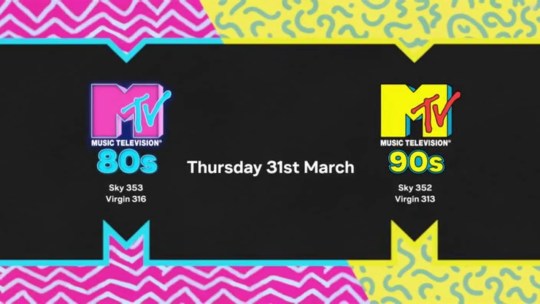


Goddammit they’re identical! What??! How did we let this happen? As a 90s survivor and a designer, this drives me up a wall.
Look, I know I’m late to the party to complain about “the 90s look” when we’re just starting to get sick of the Y2K nostalgia train. But c’mon, the 90s were not The 80s: Part Two™
Trust me when I say that we weren’t all wearing neon trapezoids up until the year 2000. The 90s look being peddled is so specific to the tail end of the 80s and an early early part of the 90s - a part of the 90s when it wouldn’t stop being the 80s. This is Memphis design being conflated with the wrong decade.


Keep reading for a long ass graphic design history lesson and pictures of old soda and fast food.

Specifically, the look is Memphis Milano, self-named by the Italian design house Memphis Group. Starting in the early to mid 80s, they made all sorts of furniture, fabrics and sculptures that were like a Piet Mondrian grid painting under heavy radiation. Their whole deal was defying the standards of existing industrial design up to that point on purpose. Chairs had weird arches, bookcases would be in strange alien colors, unusual materials like plastic or elastic were used in place of metal or wood, that sorta thing.

Memphis quickly became the signature look for the decade. You can tell something’s influenced by Memphis design from it’s telltale trademarks:
Clashing, neon colors.
Use of diametric shapes.
Contrasting patterns like zebra print stripes, confetti squiggles and checkerboards.
It wasn’t long before Memphis Milano-inspired design was everywhere in 80s pop culture:

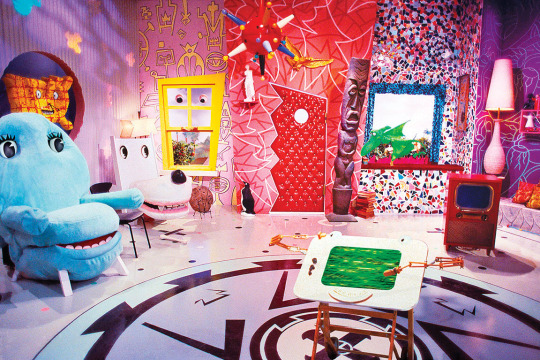
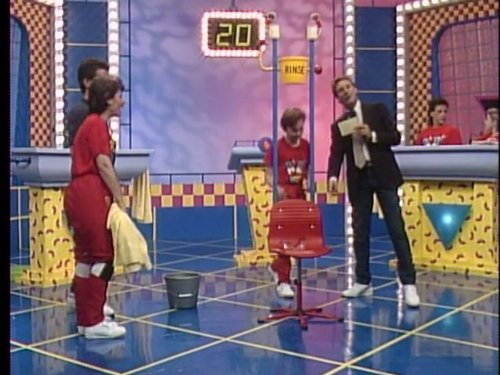
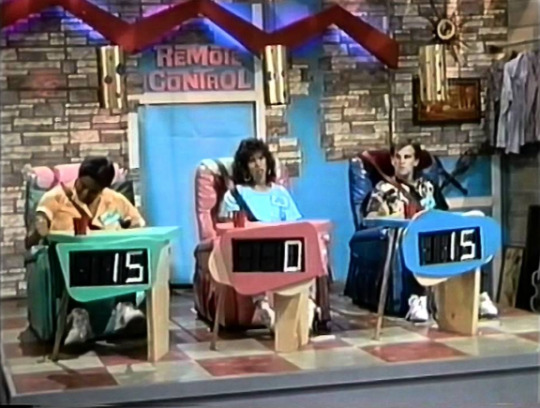
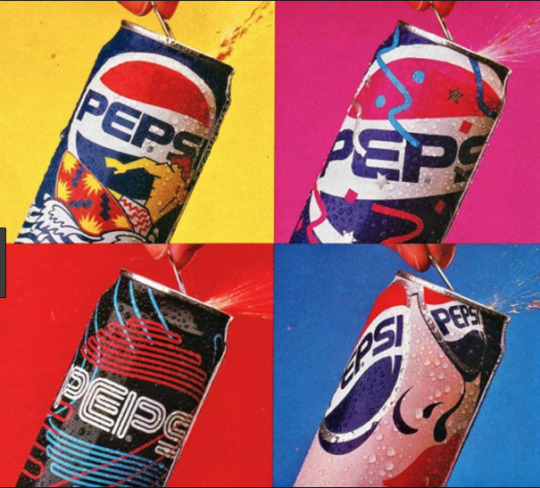


It was a special time, yes.
I was a kindergartener at the tail end of the 80s, so I knew Memphis mostly through the lens of kids media. Toys, clothes, games, tv shows used it like candy colored catnip. Cable channel Nickelodeon more or less adopted the Memphis aesthetic as their signature in-house style and practically built a monument to it at a Florida theme park:

I think this is why folks mistake what decade Memphis is representative of - 90s staples like Nick, Saved By The Bell, Fresh Prince - they all stayed around much longer than the design trend’s expiration date.



Couple that notion with the fact that companies are slow followers to design trends. Something gets popular and they want to get on the bandwagon? Gotta wait for the ink to dry, gotta wait for the production molds to be made. It would take a few years for them to completely work Memphis outta their system.

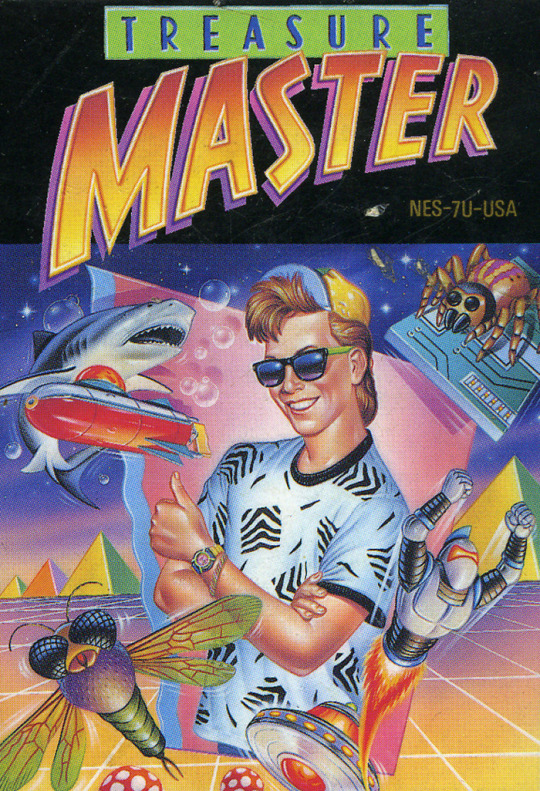
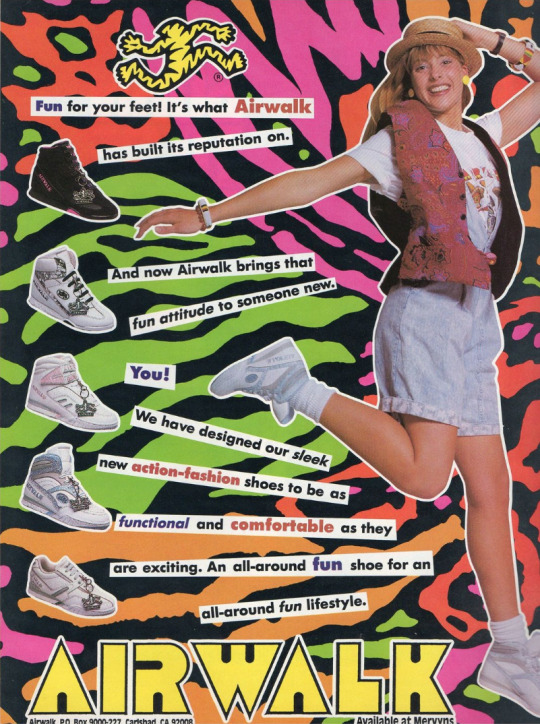
Now, this is not to say Memphis is bad! Personally I’m a fan of the aesthetic, if my neon-drenched artwork wasn’t a tip-off already. But it is a trend, and trends never last forever.
So what took the Memphis Milano look down for good? This part’s up for debate, but I personally think it had something to do with this dude:

It’s that grunge music from Seattle that’s so popular with the kids these days dontchaknow.
Once Smells Like Teen Spirit hit in 1991, the Nirvana tone drove the rest of the decade. Clean geometry became weathered, grainy and organic. Bright neon pastels became more bold. Bubblegum pop music sounded fake and manufactured. Attitude and apathy was authentic. Whatever.
Things got grungy. Things got grimy. Olestra was invented.
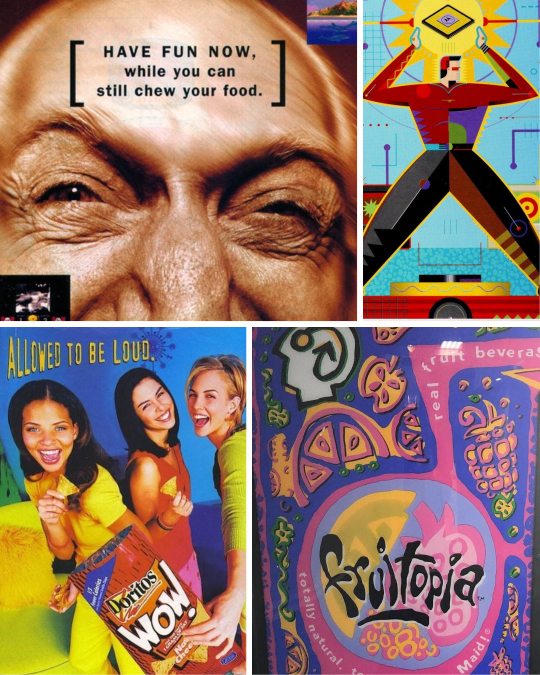
I think the best way to visualize this transition is how Cherry Coke entered the decade and how it left it:
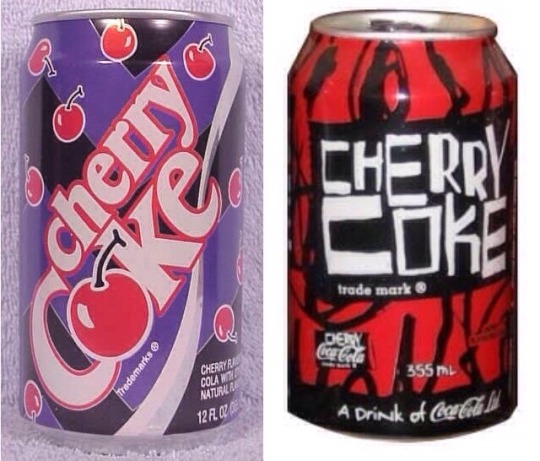
1992 Memphis on the left, 1998 grunge junkie on the right. Fitting that the 90s would end with a design that looked like Darth Maul’s lungs.
Okay, so what should 90s retro design look like?
Continue on to PART TWO! Spoilers: No VHS filters or vaporwave needed, but maybe bring an antacid.
16K notes
·
View notes
Text


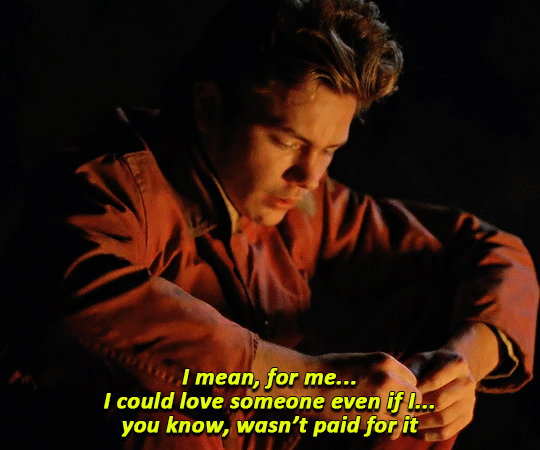

MY OWN PRIVATE IDAHO (1991)
"It’s night in the desert. Mike (River Phoenix), a teenage hustler given to bouts of narcolepsy, and Scott (Keanu Reeves), a slumming preppy prince, are huddled over a campfire. “I just want to kiss you, man,” says Mike softly. The words and the barely audible sound of his voice, caught between hope and despair, speak to anyone ever ripped apart by unrequited love. For all its flannel and Gore-Tex, the scene is a startlingly naked expression of lovelorn longing. Credit both Gus Van Sant, the director, and Phoenix, his perfect actor, with the heartbreak that floods My Own Private Idaho." — Criterion.com
#filmedit#moviegifs#my own private idaho#keanu reeves#river phoenix#userbbelcher#fyeahmovies#bladesrunner#userfilm#cinematv#lgbt#gus van sant#bynisa
592 notes
·
View notes
Text
Where is the line?
In the comics, Tim Drake's moral code is an enigma to me, particularly his stance on the Batclan's no-kill rule. For all the fans who say he's always one step away from full blown villainy, there are even more saying he's a strict goody two-shoes who could never stoop that low.
Then there's the different takes on where Tim draws the line between these two extremes. Personally, I find that line hard to pinpoint. Digging for canon demonstrations of his morals has lead me to more questions than answers. My biggest question right now is:
What counts as breaking the no-kill rule in Tim's eyes?
Luckily, the Robins 2021 comics shed some light on this. In issue #3, "Tim", or rather an imposter of him, said that choosing not to save someone isn't the same as killing them, and that letting a villain die can be a way to get justice. Normally, this point would be moot since it's not Tim himself who said it. However, at the end of issue #6, the real Tim clarified that what the imposter said WAS his real opinion on the matter.
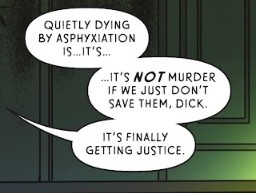
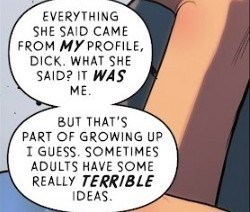
Not only that, but Tim has shown this belief through his thoughts and actions before. Twice.
The first time goes all the way back to Robin 1991 #5. During the fight against King Snake, Tim kicked him through a nearby window, fifty stories above the ground. As King Snake's life hung in the balance, Shiva appeared and commanded Tim to kill him.
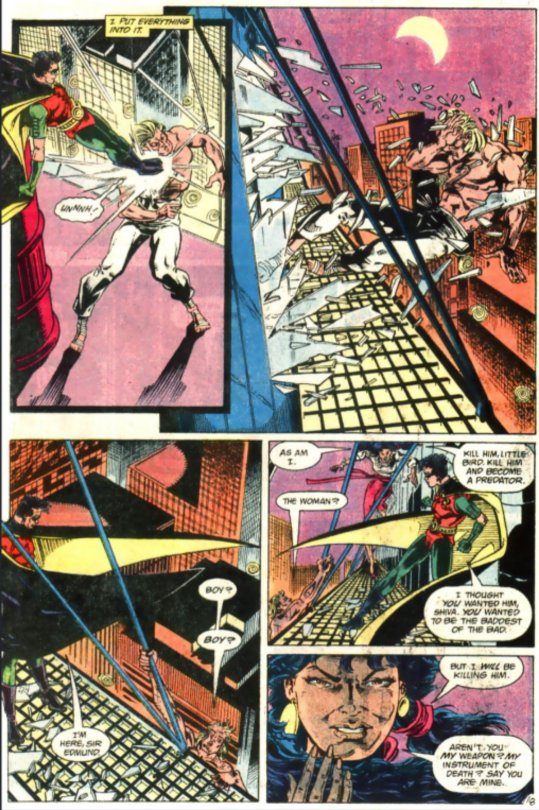
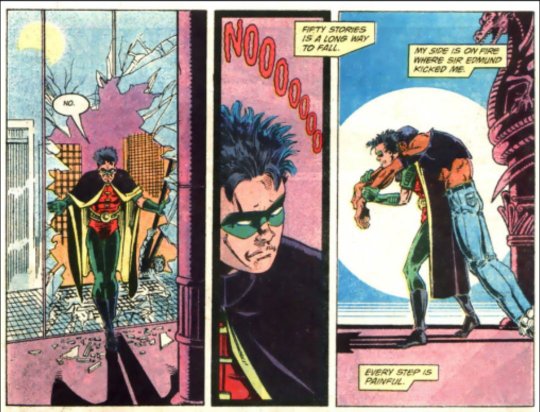
Tim refused. He walked away, leaving King Snake entirely at Shiva's mercy.
What gets me is that Tim made no move to save King Snake from falling. And he made no effort to stop Shiva from committing the murder, either. His only thought as he heard the man's scream was "Fifty stories is a long way to fall."
The second time was in Red Robin 2009 #26. Tim orchestrated a whole plan to manipulate Captain Boomerang into getting killed by Mr. Freeze. The whole time, Tim blamed Captain Boomerang for making all those bad choices, despite Tim being the one raising the chances of them being made. Tim believed he was innocent because he wasn't directly participating.
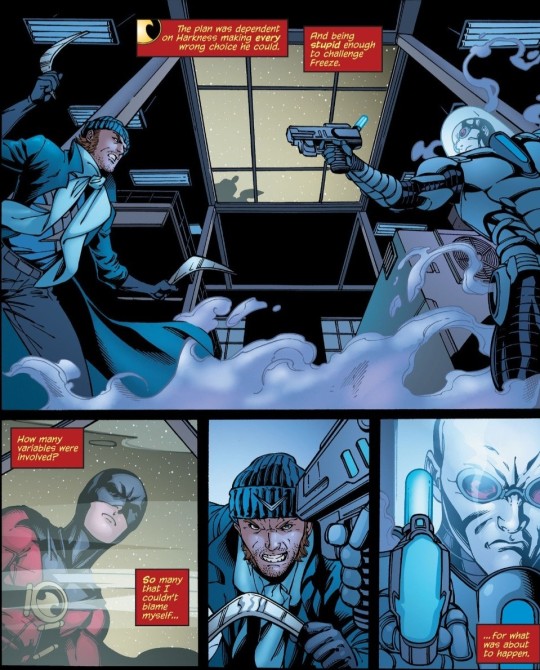
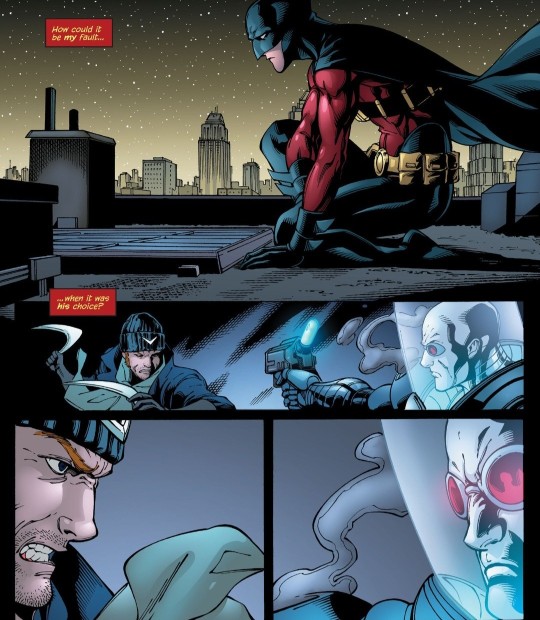
Tim then stopped that plan, but not for any noble reason. He decided that he couldn't let anyone else kill Captain Boomerang but himself.
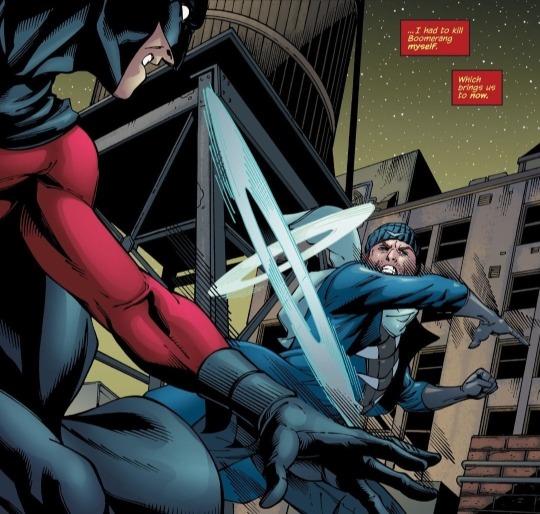
Tim couldn't bring himself to do that, either. So he had to spare his father's killer in the end.
This seems pretty cut and dry so far, right? Tim believing that letting villains die is alright as long he doesn't do the deed himself? I'd think so too, if there weren't other moments contradicting this.
In Robin #35, Steph insisted on leaving an enemy who got buried under the snow to die. Tim chastised her for it.
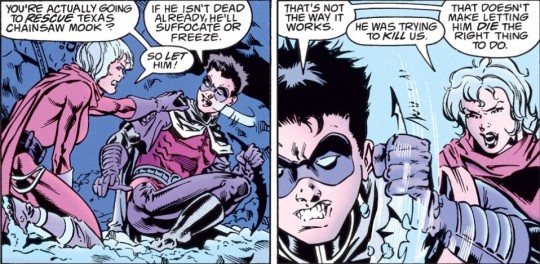
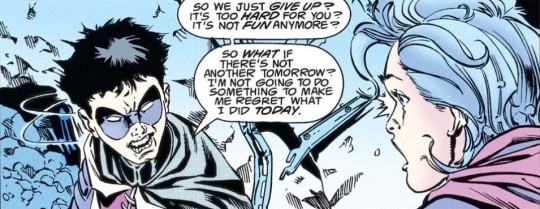
Neither of them were responsible for the snow, or for the enemy getting trapped in it. Plus, that guy tried to kill them with a chainsaw moments prior, so he's not exactly an innocent damsel in distress.
Maybe it was because this enemy wasn't a big enough fish to fry. We didn't really get confirmation that this guy has actually killed before, and he's around goon status at best.
But then in Robin #46, Tim chose to save another enemy who got himself into a deadly situation. That enemy was a murderer known as Young El. This time, Tim wasn't telling anyone else why they should save a murderer's life out loud. These were his private thoughts.
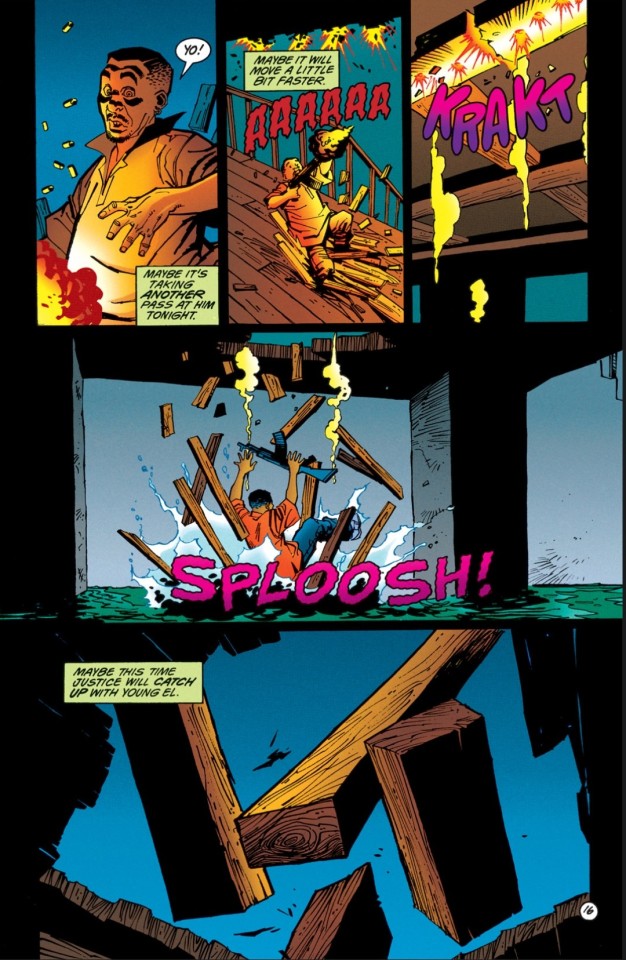
Notice how Tim's inner monologue sounded kind of on-the-fence. He contemplated justice finally catching up with Young El as the floorboards gave way, bringing a support beam down on him in the process.
However, Tim immediately switched gears to rescue Young El from under that beam before the water rose too high.
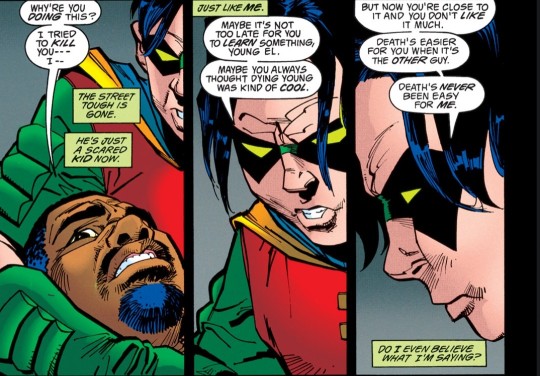
But Tim, as he told Young El the reasons he's saving him, asked himself "Do I even believe what I'm saying?" He could be asking this about two different things he said here. A) "Maybe it's not too late for you to learn something, Young El.", or B) "Death's easier for you when it's the other guy. Death's never been easy for me."
For Tim to doubt his belief in either of these statements is very interesting. He could be questioning if Young El is already too far gone for redemption, or he could be questioning if seeing someone die has never been easy for himself. For all we know, it could be both.
Unfortunately, Tim never got to see if his choice to save him would pay off. Tim wasn't strong enough to lift that beam, and Young El drowned.
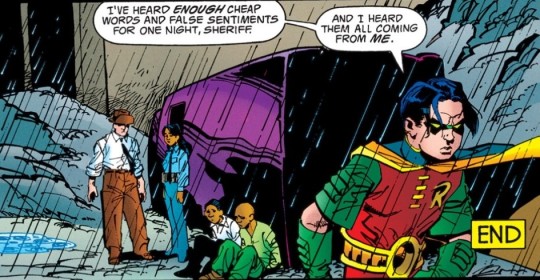
There's a question on my mind as I read these pages. What makes this murderer's death different from when Tim let King Snake fall to his "death"? Sure, King Snake didn't actually die, but Tim didn't know that until later when the man came looking for revenge in Gotham.
Tim was once able to simply walk away from what he was certain would be a killer's demise. But then he's consumed by guilt over not being able to prevent a different killer's death down the line, to the point of hallucinating.

On top of that, what changed Tim's mind later? Red Robin #26 and Robins 2021 #3-6 still happened in the future. The only significant difference I can tell is that these two comics involved the killer's of Tim's parents, making it personal. But if the Imposter from Robins 2021 got his beliefs from his profile before his mother's killer got involved, then does that still hold up?
Maybe we should put a pin on it for now. There are other things Tim's done that brings the details of his no-kill rule into question.
Such as that one time Tim actually killed someone with his bare hands.
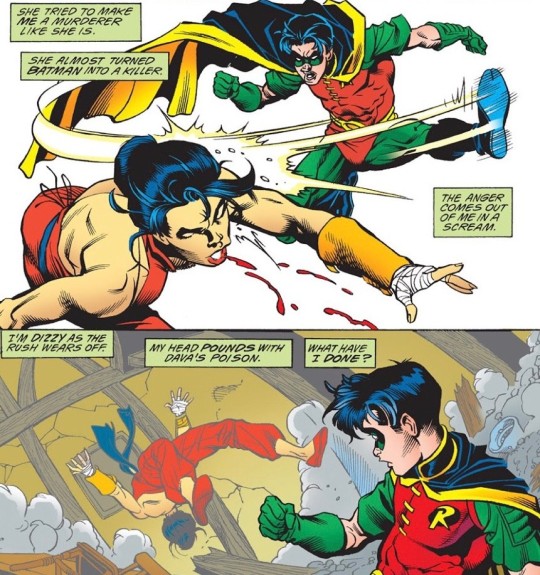
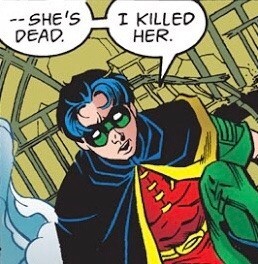
In Robin issues #51-52, Tim accidentally killed Lady Shiva while drugged on amarilla, a plant that enhances the user's speed beyond human limitations.
It may be argued if the amarilla altered Tim's mind enough to excuse him of fault or not. However, I want to focus on what happened after Shiva was revived. Here's another question to go with the first one:
Does Tim believe the kill still counts if the victim was revived afterwards?
From what I've gathered, yes and no. It's kind of complicated.
After Tim killed Shiva, he was understandably distressed about it, about how he can never take it back.
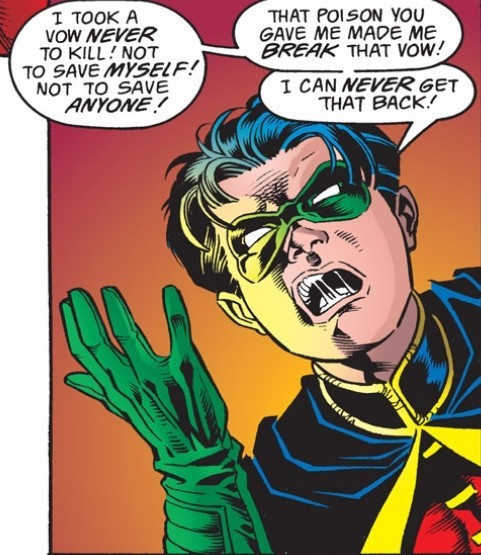
But after Shiva came back to life? Nothing. He didn't dwell on the fact he broke the vow to never kill. For something that devastating to happen in his life, it's odd that Tim didn't bring it up ever again, privately or otherwise. Especially considering what happened later in Robin #123, when Tim thought he killed Johnny Warlock.
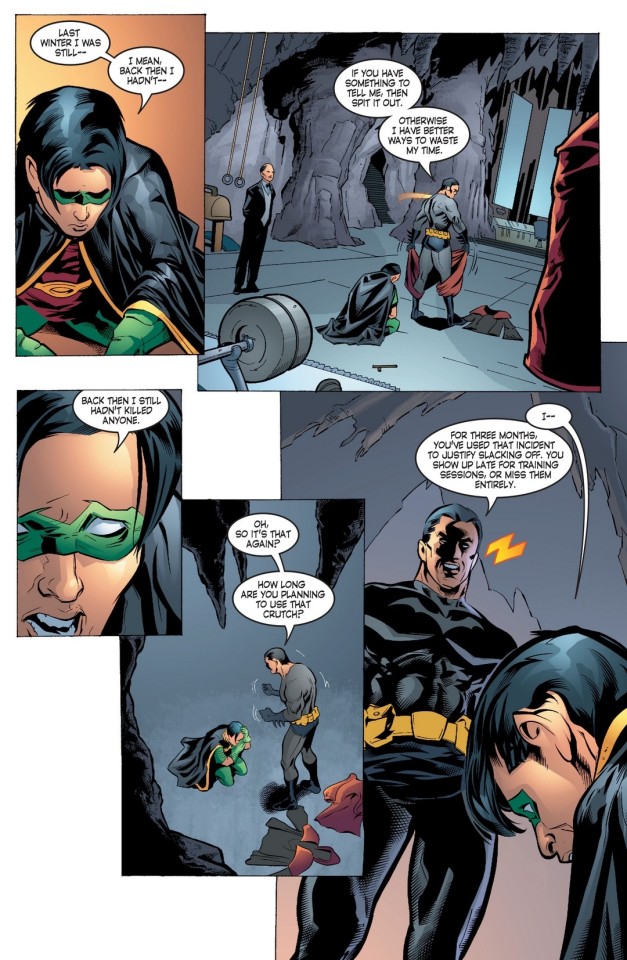
Tim was utterly inconsolable. He lost all faith in his abilities as Robin, and in himself as a whole. It also contributed to his decision to quit being Robin after his dad found out. In general, he seriously dwelled on that "kill" for a much longer time than he had after killing Shiva. The difference being that he knew Shiva was resuscitated immediately afterwards, while Tim didn't know Johnny survived until issue #141.
But there's the fact that Shiva really did die. Her heart and breathing both stopped. So are we to believe Tim moved on from that so easily because she's alive now? What happened to never getting that back?
Come to think of it, not long after Tim killed and revived Shiva, there was someone else who landed in that same boat. Dick.
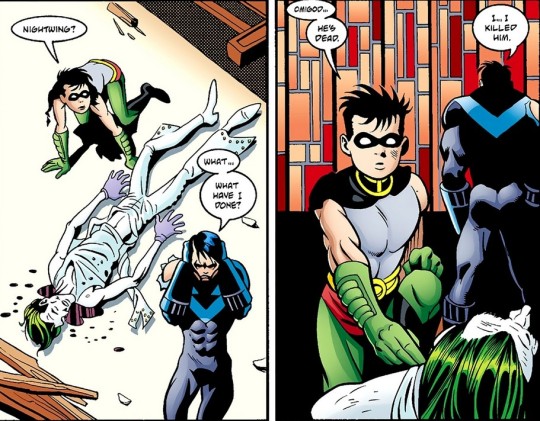
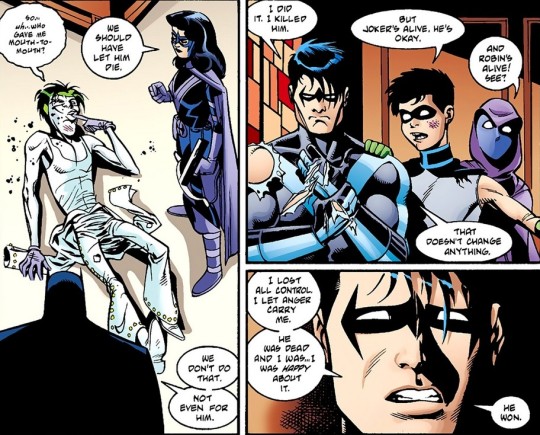
In Joker: The Last Laugh #6, Dick brutally attacked the Joker after believing he killed Tim. Dick ended up accidentally killing Joker instead, before the clown was resuscitated.
Here's the thing. While Tim was trying to comfort Dick, saying that it's ok because Joker's alive now, Dick didn't believe so. He was still distraught that he killed someone. The fact Joker came back to life afterwards didn't matter to him. To Dick, it still counted. So what does that say about Tim?
Before we move on, there's another person Tim knows who also died and came back from the grave. Jason.
Tim openly acknowledged Jason was killed before coming back, too. Multiple times. For example, when they met up in Red Hood and the Outlaws 2011 #8.
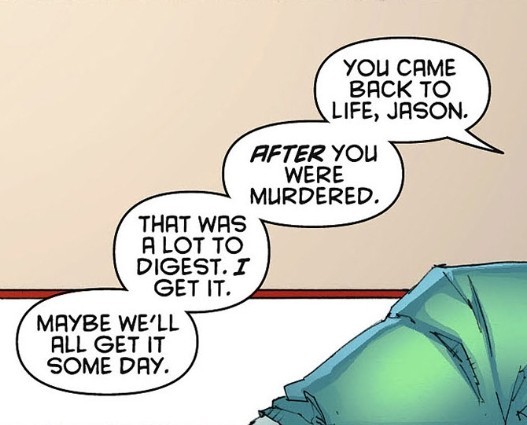
Tim hadn't shown any signs that he thinks Jason's murder doesn't count anywhere, except for maybe once.
In Knight Terrors: Robin #2, Tim and Jason had a heart-to-heart, and Tim said something strange.
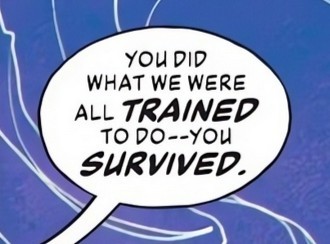
"You survived."
Except Jason didn't survive. He died. To say Jason survived that night would've meant he never died to begin with. Him being alive now doesn't change that. Was this Tim telling a white lie to make Jason feel better? Or does Tim see being revived after death as "surviving"?
Ok, now we can move onto the next question. Or rather, bear with me as we go back to the first question. It's a broad topic with plenty more to talk about.
What does Tim count as breaking the no-kill rule?
We already asked how Tim feels about bringing villains back from the dead after killing them. And we asked how Tim feels about leaving a villain to die without getting directly involved. However, we still don't know how much involvement Tim needs to have in an enemy's death before he'll take responsibility for it.
We can confirm he won't mercy kill in Red Robin #21, even if it means giving someone a fate worse than death. No exceptions.
Tim also doesn't allow anyone he's actively teaming up with to kill, especially if he's the one in command. He's been amicable with known killers before (Huntress and Pru, for example), but only when they remain non-lethal while working alongside him.
Apart from that, though, it becomes less clear. However, I think this is a good place to expand on when Tim blew up a lot of League of Assassins bases in Red Robin #8.
I'm not going into whether or not those explosions actually killed anyone. I've seen evidence supporting both sides of this debate, so I'm just going to say it's up to interpretation. What I AM talking about is whether or not Tim would've felt responsible if they had killed someone.
Before overloading every generator in the LOA database, Tim gave a warning to the Wanderer. He told her that he couldn't be held responsible for what would happen to her if she didn't leave.
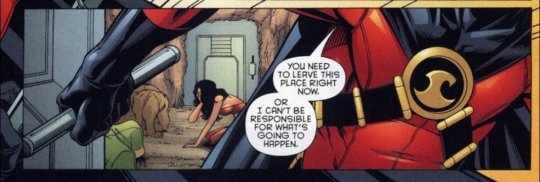
After initiating the explosions, Tim warned the White Ghost that they had fifteen seconds to leave before it was too late.
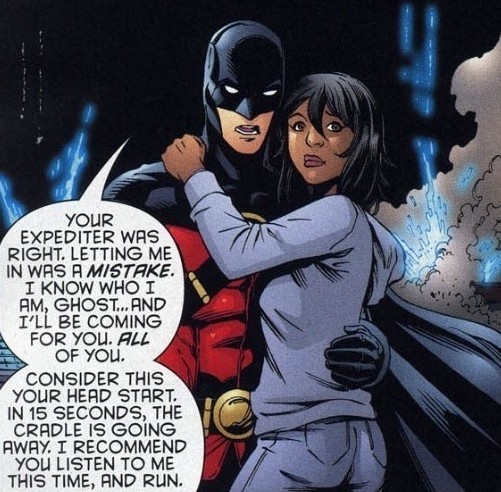
Fifteen seconds. That explanation on the mistake of letting him in might've taken roughly another fifteen to twenty seconds. Did the other bases even get a full minute head start? The way some of the people were already running away could imply they at least got a warning, but it's possible they might not have.
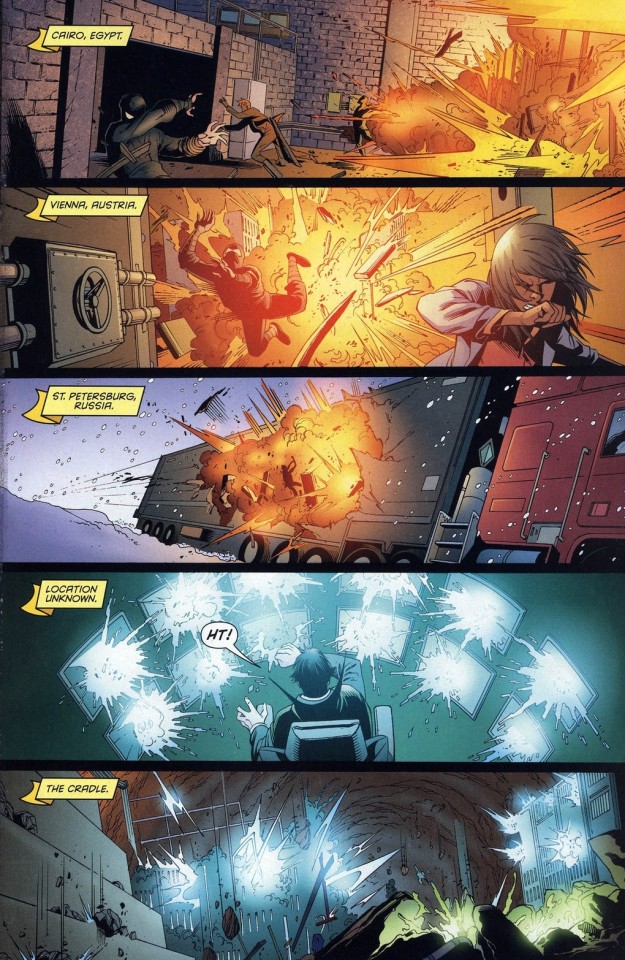
Even if everyone in every base received a warning, would that be enough for Tim to avoid holding himself accountable if they didn't make it out in time? Tim's the one who rigged the bases to explode, but I guess giving someone a warning means it's now their fault for not heeding it?
We can't be sure he even considered the possibility of those explosions killing anyone. Tim knew they were dangerous enough to bring the whole Cradle down, and the other ones we saw looked pretty powerful (except the ones in Ra's hideout). But Tim also called Ra's a murderer right after that happened, which would've been very hypocritical if Tim himself thought he committed murder.
So, my guess is either A) Tim relied on sheer luck for those explosions not causing any casualties and chose to believe they hadn't, or B) Tim didn't believe the deaths of anyone caught in them would be his fault.
Again, this isn't about whether or not blowing up the LOA bases killed anyone. It's about how willing Tim was to take that risk, and if he would've blamed himself for anyone getting killed from it.
Either way, it's canon that Tim had no guilt for the explosions he caused, or for anything he did before Red Robin #22. Just ask the Sword of Sin.
This is an exerpt I got from the Fandom DC Database on the Sword of Sin:
"The Sword of Sin can be ignited with the mind of the wielder, if the person is powerful enough. The sword has the ability to conjure in the mind its victims all of the sins for which they are guilty or have not atoned for."
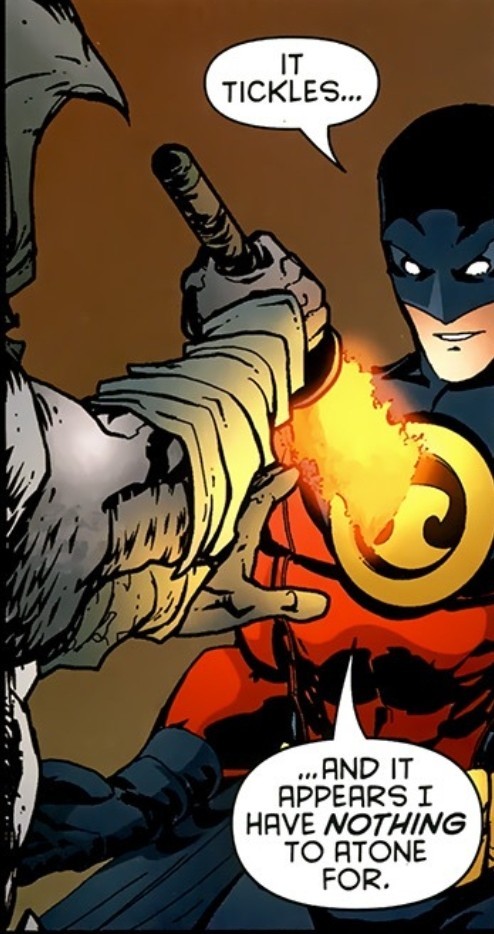
When Tim was stabbed with this sword, he was immune. The Sword of Sin decided he was innocent. Although, I have to ask how reliable this sword was in making that judgement. If the sword is judging others based on its own set principles, then something's not right here.
The Sword of Sin was also used on Dick, and he wasn't immune. It dug into Dicks subconscious and unearthed memories he'd long since repressed. Memories of himself watching a boy get beaten to near death, and then doing nothing. He just walked away.
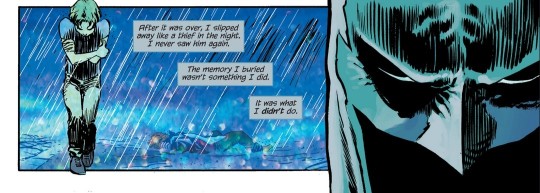
Now, tell me why the sword brought this to light, but not the time Tim left King Snake to die!
It wasn't an accident. Tim deliberately chose to leave instead of trying to save this man from the murderous Lady Shiva. Sure, Tim was no match for Shiva and he might've not been able to stop her, but the same could be said for an eight year old Dick not stopping a group of much older kids. Neither of them tried to stop the attackers.
Tim didn't atone for it, either. When King Snake returned in Batman #469, Bruce told King Snake that it wasn't Tim who left him to die. We know that's a lie, but Tim never corrected this. He let Shiva take all the blame.
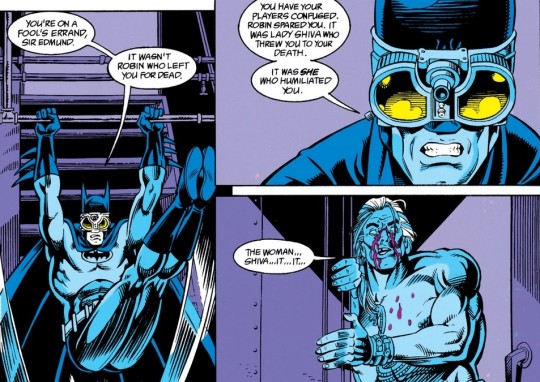
We have two instances of a boy choosing not to prevent someone from having a near death experience. One guilty, and one innocent.
Did the Sword of Sin think Tim was justified because King Snake was corrupt? That doesn't sound holy to me.
Was it because Tim didn't feel any guilt over it, while Dick did? Can the sword's judgement be thrown off by the victim not feeling any shred of guilt over their actions, even subconsciously?
That could make sense given what we know Tim did in the past: King Snake falling, the vandalism (explosions), and ALL the lying over the years (Tim reviving Shiva might count as atonement, so I'm not including that). If the sword based its judgement on God's will alone, then odds are high it would've picked up on one of these.
Even so, I'm not going to sit here and say this is definitely the case. I'm not familiar enough with how the sword effects other characters to make that call.
If this is indeed false, then did the DC universe's version of God decide to pardon Tim of his sins when he prayed earlier that same issue, despite him not believing he had any? I mean, who knows, right?
You can probably see why there's more questions than answers. The point is Tim didn't have any guilt for the things he did before Red Robin #22. Tim was canonically convinced he had nothing to atone for.
So then why did he say the opposite later in Knight Terrors: Robin #2?!
In the heart-to-heart between Tim and Jason, Tim tells him this:
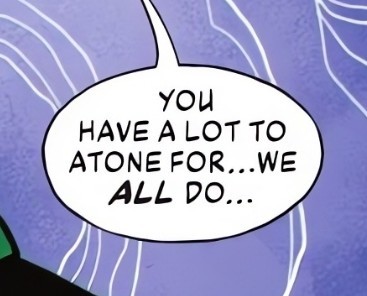
"You have a lot to atone for...We all do..."
Tim knows that the words "we all" include him, right? By saying this, Tim admitted to also having things he needs to atone for, right?
Is this another white lie to make Jason feel better? Is it one of those slight changes the New 52 made to the canon? If not, then why did he change his mind? Did his no-kill rule change and make him feel guilty for some past actions? Is it not the no-kill rule, but something else?
What changed?!
Where does Tim draw the line?
I don't know. We've narrowed it down to a general area, but it's kinda hard to see a line when it's so blurred it could be a gradient.
Tim baffles me. He acts as a steady moral compass for others when he can't even seem to stay consistent with his own. You're free to call it poor writing (and honestly, fair), but I find his hypocrisy fascinating.
That's what it is, isn't it? Tim's a hypocrite who's completely oblivious to being one. And it's not like this was never mentioned in the comics before. Damian called him out on it!
In Batman & Robin 2011 #10, Damian confronted Tim about his near-murderous reaction when Fist Point killed Artemis (Teen Titans Vol 4 annual #1). Damian then accused Tim of constantly rejecting him because they have more in common than Tim's willing to admit.
It's debatable how accurate that accusation was, but Tim had a pretty volatile reaction to it.
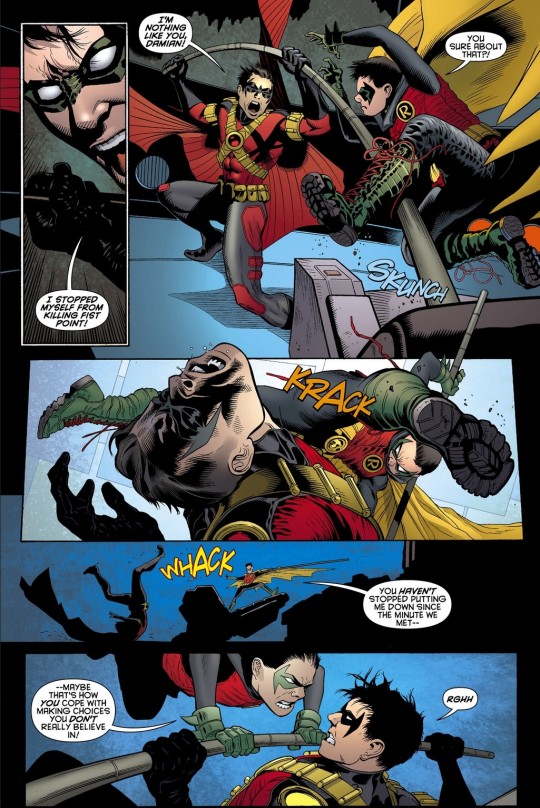
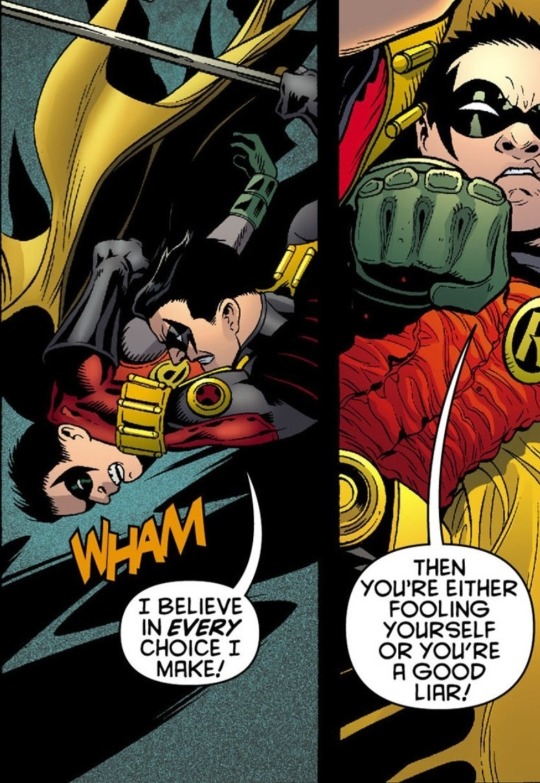
"I believe in every choice I make!"
Does he? I don't think someone who's so sure of what he believes in would contradict himself to this extent. Especially if he wasn't doing it on purpose.
He wouldn't vehemently push Bruce's no-kill rule onto others and berate them for bending that rule, only to go and bend that same rule himself when the Batclan isn't around. He also wouldn't exploit what he thinks are loopholes, decide later that those loopholes broke the no-kill rule, and then earnestly claim he never broke it.
Why is he like this?! He's had arguably the most normal childhood out of the whole Batclan before becoming Robin! What could've made him so fickle about this?!
Where does he draw the line? And how will he know when he's crossed it?
#batman#dc#robin#tim drake#red robin#theory#analysis#long post#tim drake is a menace#unhinged tim drake#To think all of this was written without mentioning Tim's corrupt future selves#or the numerous times he's actually contemplated or attempted murder#Believe me I would've loved to add 5-10 more screenshots of those moments alone#but I hit the 30 image limit :(#Anyway I want to study Tim in a lab#Feedback is welcome#I'm aware I hadn't read all the DC comics so I could've missed something
730 notes
·
View notes
Note
Hello!!
First of all, THANK YOU!!! The world has been feeling harder and more hopeless to me in recent years, and individuals like yourself help more than I will ever be able to express to bring light and hope back into my world. Loving and obsessing over gems like Good Omens, and American Gods (the novel at least, I must admit I never saw the show 🙈) have always given me motivation, sparked my creativity, and made me feel so much love for this, often unfortunately cruel, world. I can't express the solace it brings to me when the creators of the things I love are thoughtful and decent human beings. So, again, THANK YOU 🫀🫀🫀
I just finished my second viewing of Season 2 and have a question for you (my apologies if it has already been asked and/or answered and I missed it)!!
How did you select the song "Everyday" by Buddy Holly? It is absolutely perfect on so many different levels, and for so many different threads and characters, all while still encompassing the perfect feelings of this show. I always include playlists with the stories I write, and often agonize over which song is the best choice for certain moments. You had to pick one song to encompass the entirety of it, and it truly blew me away!
Thank you this Season and for everything you do; it really does mean the world to so many of us 🫀🫀🫀
In February of 1991 (I think) Terry Pratchett and I were staying in the Chateau Marmont hotel in LA. These days it is a very fancy hotel but back then it was pretty manky and run down. We were being put up by a film company and each morning we would fax over an outline for a new version of Good Omens the Movie and each afternoon we'd go to the studio for a meeting and we would realise that nobody had actually read what we had sent over that morning. Then we would go back to the hotel and work on trying to incorporate the studio notes on the outline they hadn't actually read into what we were doing.
We worked up in Terry's room because it had heating, and it was incredibly cold in LA that February, especially cold because I was in a chalet out in the grounds and there weren't heaters or extra blankets or anything in the chalet.
And at some point in there we were talking about music, and I suggested a few scary and ominous songs that might work to signal the end times. And Terry said "What about Buddy Holly's song Everyday? It sounds so upbeat and cheerful. But what if it was about the end of the world?" And I got all excited at the idea of Everyday being the Good Omens theme song.
So it's really just there to make Terry happy.
#everyday#I wrote a short story called THE GOLDFISH POOL AND OTHER STORIES about that time and that place
5K notes
·
View notes
Text
Thinking about Charles "constantly considering everyone else's feelings" Rowland and Edwin "has never had his feelings prioritized ever" Payne
----
May 1991. A library in London.
Edwin slammed his notebook down onto the table, making Charles jump.
"What is it?"
"If I have to endure that noise for much longer, I am going to go mad."
"Er… What noise, mate?"
"Don't tell me you cannot hear it," Edwin replied, going a tinge wide-eyed at the thought.
They sat in silence for a moment. Charles strained his ears. He could just make out a soft, electric hum. "That buzzing?"
"Yes!"
Charles grimaced sympathetically. "Think it's the lights, mate. The fluorescents do that. I didn't even notice 'til you said something."
"You're joking. It is maddening!"
"Guess I'm just used to it." Noticing how Edwin's shoulders had been creeping upward by degrees over the course of their conversation, Charles stood and swept the books off the table into his new backpack.
"What are you doing?" Edwin frowned.
"You said you're about to go mad, yeah? So let's go somewhere else. No reason we have to stay here, is there," Charles said with a shrug and an easy smile.
A tiny bit of tension eased out of Edwin's body. He adjusted his jacket in that proper way of his. "Well, if it isn't bothering you -"
"But it's bothering you. So let's go."
Edwin opened his mouth, then closed it again. Nodding to himself, he gathered his notebook and pen and stood up. "Very well," he said primly.
Charles grinned and slung an arm over Edwin's shoulders as they walked outside. "Love it when you talk all posh like that," he said.
Edwin shrugged out of his grasp, but Charles saw the corners of his mouth turn upwards. They walked in silence for a moment, until Edwin cleared his throat. "Thank you," he said simply.
It was Charles' turn to frown. "For what?"
"Taking my feelings into account, I guess," Edwin replied after a moment. "We didn't have to leave."
"Don't be ridiculous! Not that hard to just go somewhere else, is it?"
"It is an inconvenience."
"Pfft, barely," Charles scoffed. "Be a lot more inconvenient if those lights drove you mental, wouldn't it?"
Edwin stopped abruptly. Charles turned to face him. Edwin was pressing his fists together, which Charles recognized as a sign that he was upset about something. Even more alarmingly, his eyes were brimming with tears. He sniffed and blinked rapidly, refusing to look at Charles.
"Mate, talk to me. What's wrong? Did I say something?"
"No, it's nothing. I -" His voice caught. He cleared his throat and tried again. "I am unaccustomed to… People do not usually… care about my discomfort."
"How d'you mean?"
"In general." Edwin waved his hand. "There were things - back when I was alive - that used to bother me. Sounds, smells. Lights, sometimes. People always became cross if I brought it up. The governess, teachers -"
"Even your parents?"
"Especially my parents. I didn't dare say anything to them. Children were supposed to be seen and not heard." A note of bitterness had crept into his voice.
Charles scowled, suddenly feeling irrationally angry. If the people who'd treated Edwin that way weren't already long dead, he'd have had some choice words for them. Maybe more than that. "Well that's bollocks," he said. It came out harsher than he'd intended, but Edwin didn't flinch. He merely looked at Charles curiously. "From now on, if something's bothering you, you tell me and I'll sort it. 'kay?" He put his hands on Edwin's shoulders and looked him in the eyes. "You're not an inconvenience, Edwin. Not to me. You got that?"
Edwin took a shaky breath and nodded. He swallowed. "Thank you."
"Don't mention it." Charles smiled, then turned and continued walking, watching out of the corner of his eye to make sure Edwin had started moving too. "So, where to? There's gotta be someplace in this city where we can look at a bunch of dusty old books without obnoxious lights buzzing everywhere."
#based on true events#Edwin's gonna learn to take up space and so are the rest of us dammit#my writing#fanfic#edwin payne#charles rowland#payneland#dbda#dead boy detectives#drabbles
322 notes
·
View notes